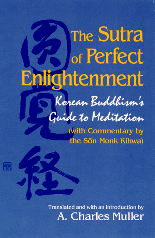
Translated by A. Charles Muller
Excerpts, Reviews, further info
What is ignorance? What is enlightenment? What is the relationship between the two? If people are originally enlightened, what is the need for practice? And if people are basically ignorant, how is it possible for them to be enlightened? Is enlightenment attained suddenly, or only over a long period of diligent practice? What is the best way to get started in the practice of mindfulness? What criteria might one use when searching for a spiritual guide?
These, and many other related questions have continued to rise in the minds of meditation practitioners of Chan, Sŏn and Zen Buddhism since the earliest stages in the development of these traditions, and it is in response to such questions that the Sutra of Perfect Enlightenment (Chinese: Yuanjue jing) was composed. In addition to detailed guidance on the undertaking of Chan contemplation, the sutra offers concise discussions of the fundamental philosophical grounds which underlie such practices, in the form of question and answer sessions between the Buddha and twelve prominent bodhisattvas. While long a popular text throughout the East Asian meditative tradition, the Sutra of Perfect Enlightenment attained to a special canonical status in the Korean Chogye school where it was favored by such luminaries as Chinul, T'aego and Hyujŏng, and where it is used down to the present day as a basic text for monastic instruction. The Sutra of Perfect Enlightenment is translated here in full, along with the eloquent and revealing commentary of the early Chosŏn monk Kihwa (1376-1433). You may order the book directly from SUNY Press, or Internet booksellers such as Amazon.com.